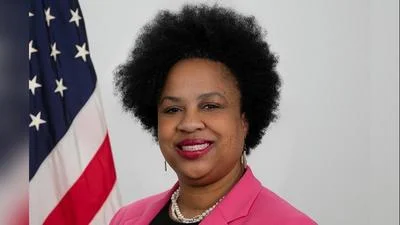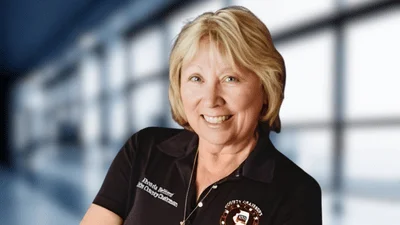Laura Gonzalez, Board Member | City of Aurora, IL, Government | Facebook
Laura Gonzalez, Board Member | City of Aurora, IL, Government | Facebook
Illinois State Board of Education, Teacher Performance Assessment Task Force met Feb. 26.
Here are the minutes provided by the task force:
I. Call to Order/Roll Call:
Dr. Jason Helfer called the meeting to order at 3:31 p.m. and asked meeting facilitator Talor Mourning to conduct a roll call. A quorum was present.
Members Present:
Senator Tom Bennett
Dr. Kathryn Chval
Elizabeth Dampf
Dr. Vito Dipinto
Dr. Marie Donovan
Shauna Ejeh
Representative Amy Elik
Dr. Andrea Evans
Shannon Fehrholz
Jessica Handy
Katrina Hankison
Dr. Terry Husband
Dr. Lori James-Gross
Bob Langman
Dr. Christie McIntyre
Jessica Nunez
Clair Siejka
Jennifer Smith
Dr. Michelle Stacy
Robin Steans
Representative Katie Stuart
Kesa Thurman-Stovall
Dr. Mary Ticknor
Dr. Diana Zaleski
Ex-officio member appointed by the state superintendent of education: Dr. Jason Helfer
Members Absent:
Dr. John Burkey
Lori Grant
Gloria Helin
Erika Mendez
Senator Laura Murphy
Dr. Abir Othman
Others Present:
Meeting facilitator: Talor Mourning (ISBE)
Dr. Jennifer Kirmes (ISBE)
Scott Anderson (Member of Public)
Meg Cappel (Member of Public)
Kellie Crawford (Pearson)
Jeremey Darnell (Member of Public)
Sandy Deines (Panelist)
Jill Donnel (University of Illinois Urbana-Champaign)
Sarah Kaufman (Member of Public)
Suzanne Lee (University of Illinois Urbana-Champaign)
Rachel Mateyka (Panelist)
Jim O’Connor (Advance Illinois)
Julie Peters (University of Illinois Chicago)
Kate Sjostrom (Member of Public)
Mary Ticknor (Member of Public)
Mercedes Wentworth-Nice (Member of Public)
II. Approval of Minutes
Dr. Helfer called for discussion on the minutes. Hearing no discussion, Dr. Helfer called for a motion to approve the minutes. The motion was made by Ms. Handy and seconded by Dr. Donovan. Dr. Helfer then called for a roll call vote. Ms. Mourning took the roll call vote on the motion.
Senator Tom Bennett - Yes
Dr. John Burkey – Not Present
Dr. Kathryn Chval - Yes
Elizabeth Dampf - Yes
Dr. Vito Dipinto - Yes
Dr. Marie Donovan - Yes
Shauna Ejeh - Yes
Representative Amy Elik - Yes
Dr. Andrea Evans - Yes
Shannon Fehrholz - Yes
Lori Grant - Not Present
Jessica Handy - Yes
Katrina Hankison - Yes
Gloria Helin - Not Present
Dr. Terry Husband - Yes
Dr. Lori James-Gross - Yes
Bob Langman - Yes
Dr. Christie McIntyre - Yes
Erika Mendez – Not Present
Senator Laura Murphy - Not Present
Jessica Nunez - Yes
Dr. Abir Othman - Not Present
Clair Siejka - Yes
Jennifer Smith - Yes
Dr. Michelle Stacy - Yes
Robin Steans - Yes
Representative Katie Stuart - Yes
Kesa Thurman-Stovall - Yes
Dr. Mary Ticknor - Yes
Dr. Diana Zaleski - Yes
The motion was passed.
III. Public Comment
Dr. Helfer called for any public comment. No requests were made for public comment.
III. New Business
Dr. Helfer moved on to new business and clarified some questions from the previous meeting. Dr. Helfer clarified terms, including “educator preparation provider,” “college supervisor,” “cooperating teacher,” and “content tests.” Dr. Helfer explained the qualifications for edTPA evaluators, including for both higher education faculty and PK-12 teachers. Dr. Helfer clarified that candidates from Illinois could not be required to submit video artifacts in the edTPA.
Dr. Helfer called for questions or comments. Senator Bennett stated that he appreciated the clarifications. Representative Stuart noted she finds it troubling that edTPA evaluators are not required to hold a teaching license or have any experience in K-12 education. Ms. Steans and Senator Bennett agreed with Representative Stuart.
Dr. Helfer then reviewed an item from an information handout that had been shared with task force members. The handout summarized the teacher performance assessments that were used in each state where they were required prior to initial licensure.
Dr. Chval clarified that the handout only looked at teacher performance assessments and not content test requirements. Dr. Chval noted she was surprised to learn so few states required a teacher performance assessment.
Dr. McIntyre stated it was interesting that in California, where the edTPA had been developed, there were many different options that could be used to fulfill the teacher performance assessment requirement.
Senator Bennett asked if the 14 states mentioned in the handout were the only states that required the teacher performance assessment; Dr. Helfer confirmed this is what had been found in via ISBE research.
Dr. Chval asked if candidates who gained licensure in a state that did not require a teacher performance assessment were required to then pass a teacher performance assessment to gain licensure in Illinois. Dr. Helfer explained this was not a requirement; rather, candidates could earn their Illinois license via the reciprocity process, in which candidates received the most comparable Illinois license to the valid out-of-state license they held.
Senator Bennett clarified that some states require only the edTPA as their teacher performance assessment, but other states offer other teacher performance assessments options in addition to the edTPA. Ms. Mourning further clarified that the handout only included states that require a teacher performance assessment prior to initial licensure but that some states may still utilize a portion or variation of a teacher performance assessment.
Dr. Helfer then moved on to the panelist portion of the meeting. The task force had extended invitations to current or retired teachers who had served as cooperating teachers for student teacher candidates. Two such panelists, Sandra Deines and Rachel Mateyka, were able to attend the meeting. The task force members then engaged in asking questions of both of them regarding their experiences as cooperating teachers.
Ms. Mateyka shared she felt the teacher performance assessment had become a time-intensive checklist rather than an opportunity to reflect on the student teaching experience. Dr. Helfer asked Ms. Mateyka her thoughts on how a teacher performance assessment could be more reflective in nature. Ms. Mateyka suggested the student teaching assessment should offer more opportunities to reflect on what went well in the classroom, how to adjust future lessons, and how to clarify student learning.
Ms. Deines shared her opinion that a teacher performance assessment that is formative over the process of student teaching would offer more opportunities for feedback and reflection. Ms. Deines stated she had concerns about assessments that were summative, as they could interfere with the student teaching growth process and be a distraction for the student teacher. Ms. Deines also shared examples of student teachers she had worked with who engineered lesson plans to meet the expectations of the edTPA or student teachers who had refused to accept placement in certain school districts, fearing they would not be able to pass the edTPA.
Representative Stuart stated if what candidates submit in their edTPA materials is engineered, it is not necessarily reflective of their real experiences as a student teacher.
Senator Bennett asked the panelists their opinion on how cooperating teachers and student teachers should work together and how much weight the cooperating teacher feedback should hold. Ms. Deines shared she thought the relationship needed to be clearly defined at the start of the student teaching experience. Ms. Mateyka shared that she and other colleagues who had served as cooperating teachers had concerns that their feedback to the preparation program had not been fully taken into account when it came to passing the student teacher candidate. Ms. Mateyka felt the cooperating teacher input should be taken more seriously as an honest and holistic review of the student teacher candidate’s teaching skills.
Dr. Donovan asked what types of “engineering” had been taking place in order to impact edTPA score. Ms. Mateyka shared examples of student teacher candidates being overly selective when it came to choosing the school districts, classes, days of the week, or lesson plans so that they could have the best chance of passing the edTPA task. Ms. Mateyka felt this method often did not accurately reflect the entirety of the student teachers’ skills or abilities. Ms. Deines explained that “engineering” sometimes has to happen in order for these candidates to successfully meet the edTPA task requirements.
Ms. Deines shared that data reported by edTPA in 2017 and 2018 indicated candidates in rural areas were having a more difficult time passing the edTPA. Ms. Deines felt that assessments that did not consider specific attributes of the district placement or skillset of the candidate were problematic.
Dr. Donovan asked the panelists their opinion regarding the role of the cooperating teacher in a candidate's evaluation. Ms. Mateyka shared she felt it was a concern when cooperating teachers’ recommendations were not taken into account by the institution when considering whether or not to pass the student teacher, but that cooperating teachers should not be the only source of evaluation for student teachers.
Sarah Kaufman, a member of the public, then shared her opinion that student teachers could benefit from additional skill-building in the clinical setting that takes place prior to student teaching.
Ms. Steans asked the panelists if they felt cooperating teachers could successfully offer both formative and summative assessment throughout the student teaching experience. Ms. Mateyka stated she felt she did not always get clear direction from the preparation programs on how she should share her cooperating teacher feedback. Ms. Steans asked if the panelists had received any cooperative teacher training, and Ms. Mateyka stated she had not received training and explained her philosophy and methods were modeled off her own cooperating teachers.
Ms. Deines spoke about the relationship between the cooperating teacher and student teacher and acknowledged it was a complex relationship in which the preparation program had an important role to play in helping establish that relationship.
Dr. Helfer noted there had been an exchange in the meeting chat regarding the different roles and responsibilities for the student teacher and cooperating teacher and acknowledged this was a question the group would have to answer in the coming months.
Dr. Helfer asked the panelists if there were things cooperating teachers had to change about their practice to help prepare candidates to successfully complete the edTPA. Ms. Mateyka shared she had completed the edTPA herself but had not had student teachers who had completed it. Ms. Mateyka shared the practice edTPA had been helpful for her to prepare for the edTPA.
Dr. Helfer asked if the questions and tasks in the practice edTPA made sense within the coursework, field experiences, and skills a new teacher would need to be successful. Ms. Mateyka explained that in her experience in special education, the tasks had made sense, but that was not always the case for student teachers taking the general education version. Ms. Deines shared that she had observed student teachers have to change the intended classroom curriculum to be able to complete the required tasks in the edTPA. Ms. Deines stated she felt that sometimes the candidates who earn the highest scores on the edTPA were not necessarily the highest-performing classroom teachers. Ms. Deines also stated that some student teacher candidates had not been able to get involved in activities within the school and district because they had to spend their time preparing for the edTPA.
Dr. Helfer asked if any other task force members had questions for the panelists. Ms. Steans asked if expanding the length of time of student teaching would allow more time for extra reflection and skill-building. Ms. Mateyka spoke about how most teacher evaluations are rooted in Danielson’s Framework and felt student teacher assessment should be as well.
Ms. Steans asked if the panelists felt the edTPA had overlap in the Danielson Framework. Ms. Mateyka stated she felt it was there in the special education assessment but could not speak for the general education assessment.
Dr. Helfer thanked the panelists for joining the meeting and sharing their experiences. Dr. Helfer encouraged task force members to share any of the panelists’ recommendations or questions with Ms. Mourning prior to the next meeting.
IV. Adjournment
Dr. Helfer asked for a motion to adjourn the meeting. Dr. Donovan motioned for adjournment. Dr. Dipinto seconded. All members present unanimously agreed to the motion.
The motion was passed.
Meeting adjourned at 5:02 p.m.
https://www.isbe.net/Documents_TPA/022624-Minutes.pdf






 Alerts Sign-up
Alerts Sign-up